It might not feel like it for most New Jersey Devils fans, but Feb. 4, 2020, marked the 10-year anniversary for the team acquiring Ilya Kovalchuk in a blockbuster trade with the then-Atlanta Thrashers.
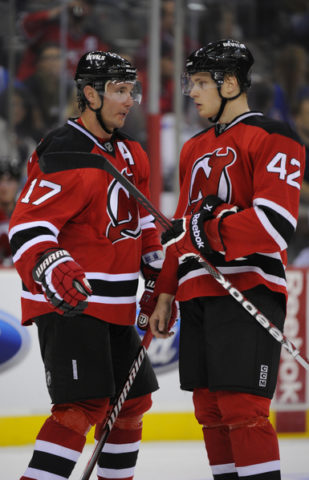
While most Devils fans are still upset about Kovalchuk’s early departure from New Jersey and the NHL during the 2013 offseason, there’s a case to consider that Jersey’s team was better off moving forward without the Russian sniper.
The Beginning for Kovalchuk & the Devils
New Jersey acquired Kovalchuk via trade prior to the 2010 NHL Trade Deadline in hopes he’d be the superstar forward to help the Devils advance past the second round of the Stanley Cup Playoffs for the first time since 2002-03.
The right-handed shooter was in his prime years and set to become an unrestricted free agent that offseason. The 2001 No. 1-overall draft pick wasn’t planning on re-signing with a perennial losing team like Atlanta – and it appeared general manager Lou Lamoriello acquired Kovalchuk as a rental considering the potential contract the six-time, 30-goal scorer was expecting.
In exchange for Kovalchuk, New Jersey coughed up stud defenseman Johnny Oduya in addition to prospects Niclas Bergfors and Patrice Cormier. Atlanta also acquired a 2010 first-round pick, while the teams swapped 2010 second-round picks and sent the Devils defenseman Anssi Salmela.
While Kovalchuk was a point-per-game skater with New Jersey to close out the 2009-10 campaign (10 goals, 17 assists) in 27 games, it’s fair to say No. 17 didn’t exactly mesh with the team’s style of play on the ice. Then, the Devils were coached by Jacques Lemaire and played more of a systematic and team-oriented fashion – nothing was necessarily attractive about the team’s execution in all three areas on the ice, but the Devils were successful and earned another Atlantic Division title.
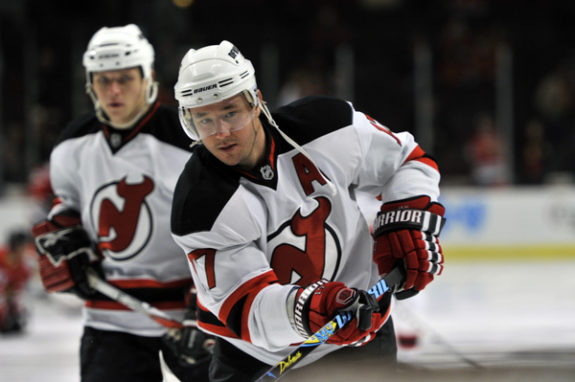
It was apparent when Kovalchuk arrived that he was a flashier skater, tried to do too much at times and defensively wasn’t as responsible as fellow teammates Patrik Elias, Jamie Langenbrunner, Travis Zajac or Zach Parise. Through the first 10 games with the Devils, Kovalchuk and New Jersey clearly struggled to adjust and managed to win a mere three games. The struggles were a stretch that the team hadn’t experienced all season.
New Jersey later finished the campaign as the second seed in the Eastern Conference standings, but was eliminated by the Philadelphia Flyers who were the seventh seed. In fact, the Devils were dominated by the City of Brotherly Love in the first-round matchup and upset in five games.
It seemed that the Kovalchuk experiment in New Jersey was a bust and that there was no chance the Devils would offer Kovalchuk the extensive and $100 million contract he was seeking that offseason.
The Infamous Contract
Lamoriello and the Devils surprisingly pursued Kovalchuk during unrestricted free agency and managed to sign the superstar to the league’s longest contract ever. The original contract was set for $102 million over 17 years.
At the time, the then-27-year-old’s contract wouldn’t expire until he was the age of 44 and at the end of the 2026-27 campaign. Still, the league declined the original contract considering how “front-loaded” the deal was and that the Devils were essentially breaching the regulations of the salary cap. Keep in mind that the forward would have been earning less than $1 million, per year during the final five seasons of the deal.
Somehow, the league and the Devils managed to agree on a 15-year-deal worth $100 million for Kovalchuk. It was certainly an odd and confusing start for “Kovy” and New Jersey, which arguably should have been an omen for the future.
The Bad, Ugly and Brief Good
Kovalchuk’s first full season with the three-time Stanley Cup champion organization was brutal, to say the least. The beginning to the 2010-11 season under rookie head coach John MacLean was one of the worst starts in the team’s history.
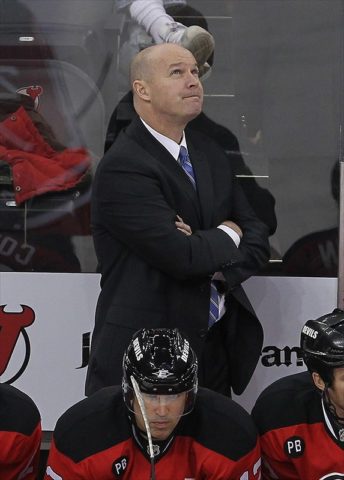
The expected Stanley Cup contenders won on four occasions through 16 games to begin the new Kovalchuk era in the Garden State. MacLean was eventually fired, and Lemaire returned out of retirement to help salvage the lost season after what appeared to be a historic campaign for all the wrong reasons.
Still, that Devils team will always be remembered for being the first squad to break the team’s impressive playoff streak of 13-straight seasons, after finishing out of the top-eight for the conference.
The following season was a complete turnaround for the Devils and Kovalchuk. The team was consistent all season under newly appointed head coach Pete DeBoer and No. 17 finished the campaign with 83 points (37 goals, 46 assists). That mark is tied for the 10th-most points in a single season for the franchise.
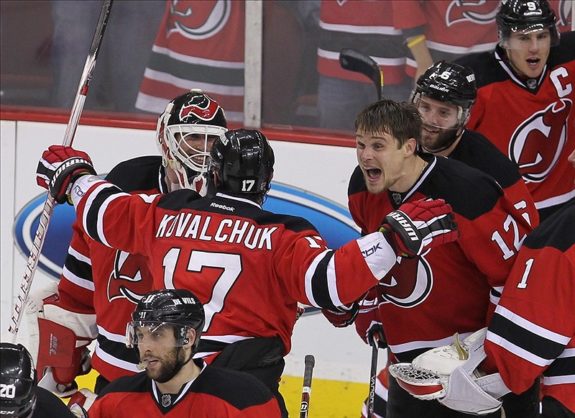
The beauty of it all was the fact that the Devils weren’t just back to competing as playoff contenders, but that New Jersey advanced to the Stanley Cup Final for the first time since 2002-03. While the team was defeated in six games to the Los Angeles Kings in the Final, it was apparent Kovalchuk was blossoming in a Devils sweater and New Jersey also took down the New York Rangers in the Eastern Conference Final – a bittersweet moment for any Devils fan.
The risk to sign Kovalchuk to an absurd contract seemed to have been paying dividends.
The Sudden Departure
The 2012-13 campaign was another forgetful season during the Kovalchuk era. The team finished in last place for the Atlantic Division while missing the playoffs for the second time in the past three seasons. For once, the team appeared to be on the decline due to its roster and some aging superstars, such as Elias and goaltender Martin Brodeur.
The campaign wasn’t just a shortened season due to another NHL Lockout. Kovalchuk missed an additional 10 games thanks to a shoulder injury and it was apparent the team struggled with or without him in the lineup.
On July 11, 2013, Kovalchuk shockingly retired from the NHL with a “desire” to return home to Russia, where he would skate for St. Petersburg SKA. The move left fans in an uproar and it seems that Jersey’s faithful still hasn’t forgiven the one-time Devil considering fans insist on booing him anytime he returns to the Prudential Center.
Why the Devils were Better Off
While Kovalchuk’s retirement left New Jersey with a salary-cap penalty of $250,000 per season until the end of the 2024-25 season, his retirement was for the better in relation to the Devils.
Reflecting on the state of the team after the 2012-13 campaign, New Jersey wasn’t trending in the right direction and didn’t necessarily have assets in the pipeline that could eventually build around an all-star skater like Kovalchuk.
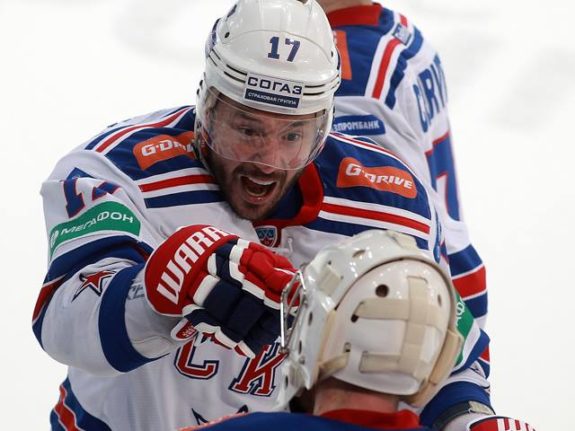
Forwards Miles Wood (2013) and Blake Coleman (2011), plus defenseman Damon Severson (2012) are the lone skaters that were drafted from that era and currently skate with the team. Still, neither of those players are exactly the kind of players that would complement Kovalchuk and vice-versa. Coleman and Wood didn’t blossom into full-time NHL skaters until three seasons ago, either.
Following life without Kovalchuk, Lamoriello signed skaters, such as Jaromir Jagr and Mike Cammalleri, who experienced short stints of success with the team. But again – the rosters formed were never playoff contenders and arguably safe to say a one-dimensional skater like Kovalchuk wouldn’t have jump-started those Devils teams that missed the playoffs from 2013-14 until the end of the 2016-17 season.
Plus, the Devils more than likely would have just ended up finishing with more below-average seasons and similar finishes to what Kovalchuk experienced with Atlanta for almost a decade. The Devils likely wouldn’t have won the Draft Lottery come 2017 when the team selected its future franchise skater in Nico Hischier, or then again in 2019 with Jack Hughes. An attempt to build around a veteran such as Kovalchuk with his type of contract would have been the primary focus.
Let’s not forget that Kovalchuk would have been frustrated with the state of the team and fans would also grow critical of his play and leadership given his contract situation. It’s also safe to say the Devils would have found themselves in a bigger hole trying to move Kovalchuk and his contract via trade than just having him leave and not having to pay the sniper.
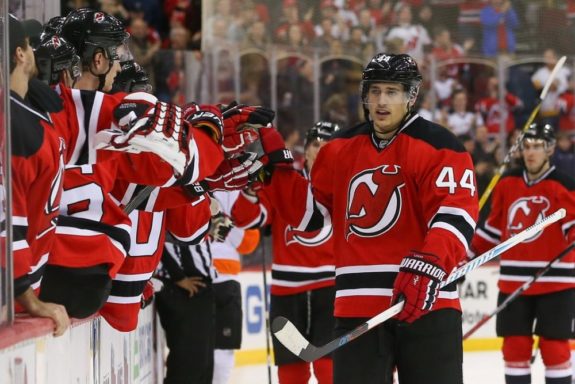
For the record, Bergfors and Cormier never blossomed into the projected skaters they were supposed to. Bergfors left the NHL after the 2011-12 season and was traded from Atlanta towards the end of the 2010-11 season. Cormier record five points in his NHL career, which came to end after the 2015-16 season.
The only aspect of that deal that seemed to prosper post-trade was Oduya since he eventually won two Stanley Cups with the Chicago Blackhawks. The 2010 first-round pick Atlanta acquired from New Jersey was later flipped in a deal to Chicago, which eventually turned out to be forward Kevin Hayes. Hayes later opted not to sign with the Blackhawks and held out for unrestricted free agency to join the Rangers.
Fast forward not even seven seasons later, Kovalchuk returned and signed with the Kings on a three-year deal for the 2018-19 season. The Kings struggled and dwindled in the standings while Kovalchuk helped sink that ship out in the Western Conference. Let’s not forget his contract was terminated earlier this season after he clearly wanted to bail on another team whose structure was similar to Jersey’s seven years ago.
Yes, Kovalchuk “left” and disappointed fans but there was no substance for him or the team to succeed together. There was never any “winning” that would be involved with Kovalchuk and the Devils after the 2011-12 Cup run.